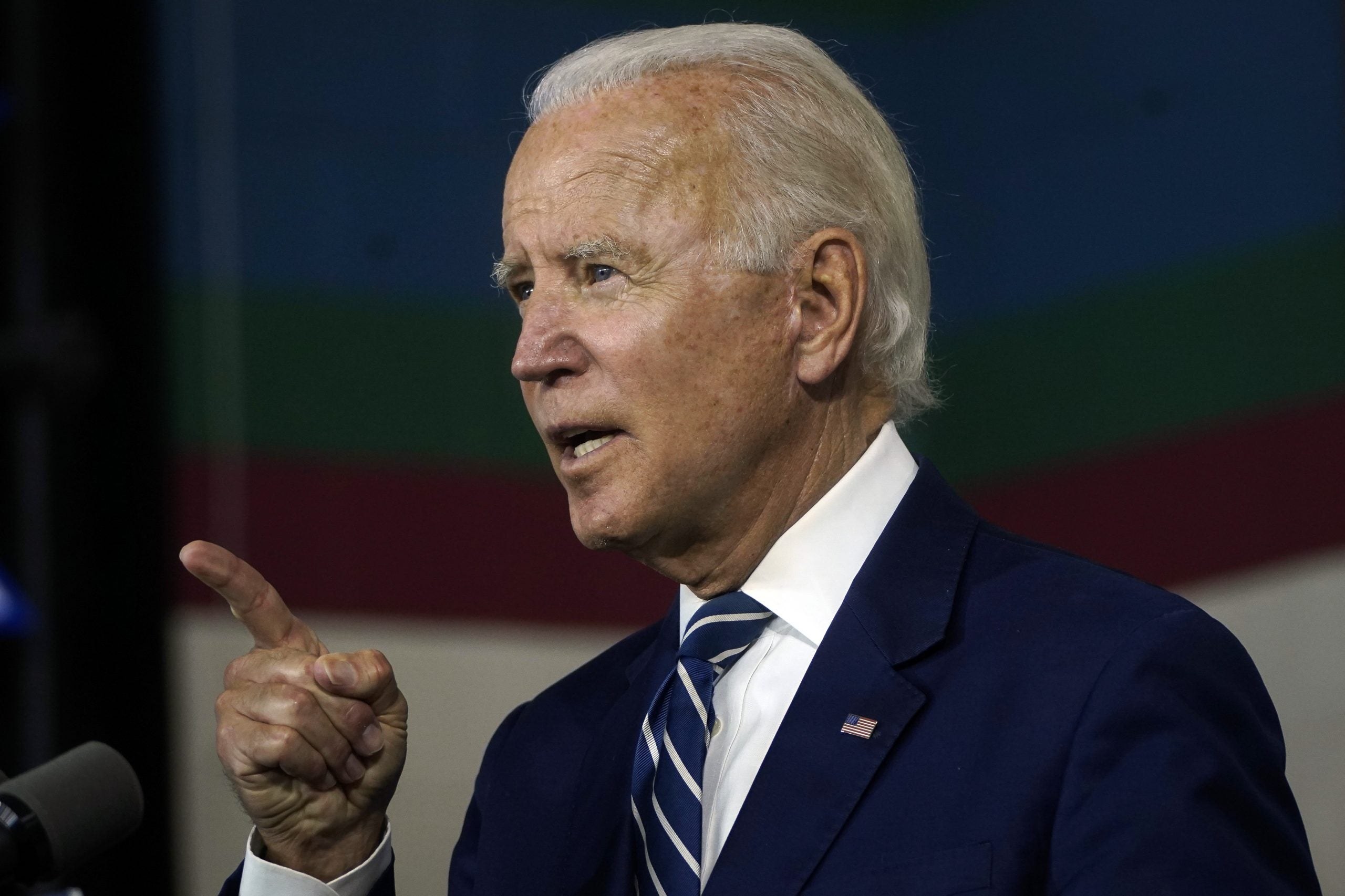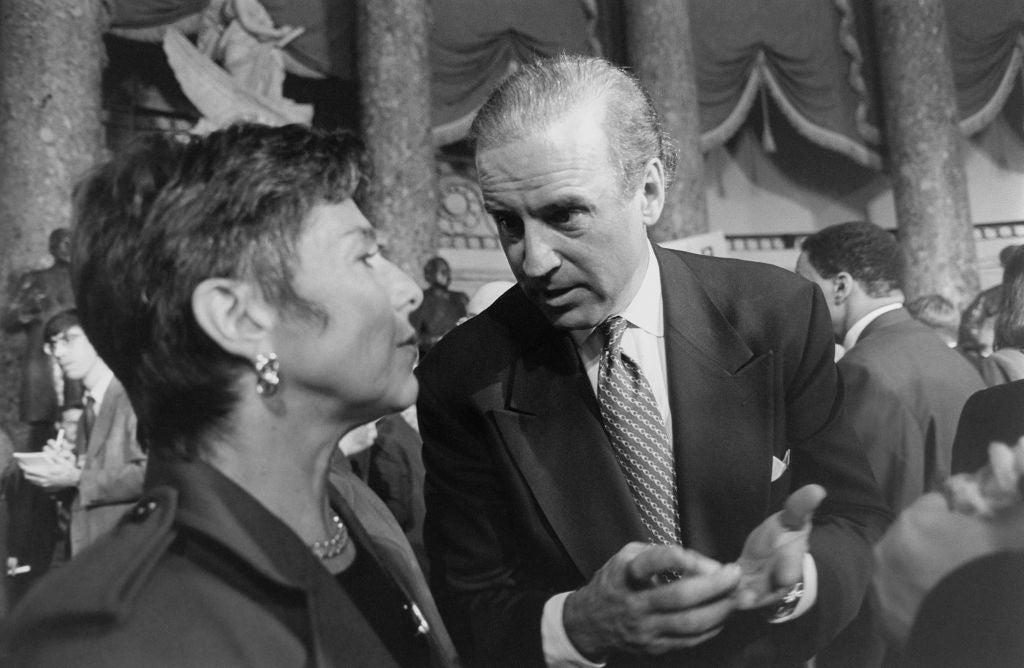
Former Vice President Joe Biden admits that some of the 1994 Violent Crime Control and Law Enforcement Act that exploded mass incarceration in the United States and continues to devastate Black and Brown communities was a “mistake,” but reiterated that it was widely supported by Black leaders and that he still opposes defunding the police.
During the town hall in Philadelphia on Thursday, Biden, the bill’s primary architect, said it was a different time then. “The Black Caucus voted for it, every Black mayor supported it across the board,” he said.
Touting the Violence Against Women Act, which was a part of the bill, Biden placed blame on states for the harmful parts of the legislation as opposed to something being inherently wrong with the bill itself.
“But here’s where the mistakes came,” he said. “The mistake came in terms of what the states did locally.”
What Biden conveniently leaves out is the state incentives baked into the bill. He also left out how Democrats push “tough-on-crime” rhetoric when convenient and social justice talking points when it’s not.
“The liberal wing of the Democratic Party is for 100,000 cops. The liberal wing of the Democratic Party is for 125,000 new state prison cells,” Biden said in 1994 on the Senate floor. “I’d like to see the conservative wing of the Democratic Party.”
After the bill’s passage, signed into law by then President Bill Clinton, many states would soon pass their own version of “three strikes” laws, and they would be awarded Truth in Sentencing grants to build and expand prisons. Additionally, the Atlantic‘s Todd S. Purdum reports, “A 2002 Urban Institute study found that from 1995 to 1999, nine states adopted such laws for the first time, while 21 others changed existing laws to qualify for the funds. By 1999, a total of 42 states had such laws in place. At the same time, many states passed their own tougher sentencing laws, which only exacerbated the trend.”
The crime bill did have widespread Black support, but not “every Black mayor,” as Biden said. At the time, the NAACP called it a “crime against the American people.” When it passed in 1994, it was with the help of the vast majority of the Congressional Black Caucus and the support of NIMBY Black community leaders who believed that increased punitive punishment would save “good” Black children from “bad” Black children who were allegedly involved in criminal activity. Professor Michelle Alexander explained that some of the leaders reluctantly supported the bill and expected reinvestment in Black communities—schools, better housing, health care and jobs. But that’s not what happened.

Before the 1994 crime bill could make it through the House, Clinton agreed to the removal of the Racial Justice Act—which would have allowed incarcerated people to bring challenges to their death sentences based on data showing that racial bias was a factor at the time of their trial.
The bill was also stripped of $3.3 billion—two-thirds of it from prevention programs—and a provision that would have made 16,000 low-level drug offenders eligible for early release.
Today, the U.S. is the largest jailer in the world. And, in 2019, speaking about the crime bill at a breakfast in Washington D.C. held to commemorate Dr. Martin Luther King Jr.’s 90th birthday, the former Vice President said, “It was a big mistake that was made. We were told by the experts that ‘with crack you can never go back’…it’s trapped an entire generation.”
Despite this reality, and as protests against police violence rock and transform the world, Biden continued to adamantly defend his opposition to the Movement for Black Lives’ call to defund the police. He did, however, reiterate his position that no one should be incarcerated for drug use, that marijuana should be decriminalized, and that people with records for cannabis possession should have their records cleared. Instead of jails, he said the United States should instead build rehab centers and make treatment mandatory.
Of course, not all drug use is problematic and mandatory rehab is not much different than incarceration. Further, most researchers agree that there is no evidence that mandatory rehabs work, according to Boston Medical Center’s global analysis.
After the Philadelphia town hall, Stef Feldman, a Biden campaign staffer, tweeted that Biden was discussing the “86 crime bill,” not the 1994 crime bill. In fact, Biden sponsored and co-wrote the Anti-Drug Abuse Act of 1986, which created new mandatory minimum sentences for drugs and the crack vs. cocaine sentencing disparity—which was reduced, but not erased, by President Barack Obama. Biden also co-sponsored the Anti-Drug Abuse Act of 1988.
He, along with segregationist—and avowed racist—Sen. Strom Thurmond (R-SC), spearheaded the 1984 Comprehensive Control Act, which expanded drug trafficking penalties and federal civil asset forfeiture, allowing law enforcement to seize property without proving an individual is guilty of a crime.
Bearing these pieces of legislation in mind, it perhaps best serves the Biden campaign to focus on defending “parts” of the 1994 crime bill and shifting blame to states for the others.




